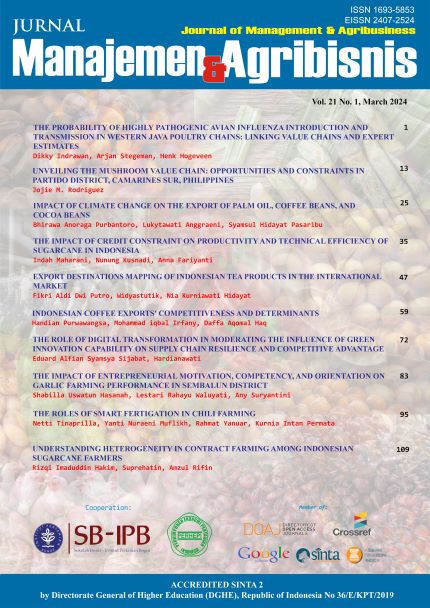Understanding Heterogeneity in Contract Farming Among Indonesian Sugarcane Farmers
Abstract
The transformation of the agricultural value chain on the production side is illustrated by the increased engagement of small-scale farmers facilitated by agribusiness firms through contract farming agreements. It is believed that the varied ramifications of contract farming are influenced not solely by contextual and implementation disparities but also by variations in the attributes of participating farmers. The dataset utilized in this investigation was sourced from the 2014 Indonesian Household Plantation Survey, comprising information from 8816 sugarcane farmers. Principal component analysis and cluster analysis were employed to categorize sugarcane farmers statistically and scrutinize the structure of sugarcane contract farming in Indonesia. Findings unveiled four distinct clusters of sugarcane farmers with discernible and significant dissimilarities in attributes. Contract farming is predominantly characterized by adult farmers with moderately sized self-owned land managed intensively and relatively favorable institutional access. Conversely, non-contract farming consists of adult farmers with small self-owned land working non-intensively and having limited institutional access.
Keywords: cluster analysis, contract farming, principal component analysis, sugarcane
Authors
Authors who publish with this journal agree to the following terms:
- Authors retain copyright and grant the journal right of first publication with the work simultaneously licensed under a Creative Commons Attribution License that allows others to share the work with an acknowledgement of the work's authorship and initial publication in this journal.
- Authors are able to enter into separate, additional contractual arrangements for the non-exclusive distribution of the journal's published version of the work (e.g., post it to an institutional repository or publish it in a book), with an acknowledgement of its initial publication in this journal.
- Authors are permitted and encouraged to post their work online (e.g., in institutional repositories or on their website) prior to and during the submission process, as it can lead to productive exchanges, as well as earlier and greater citation of published work (See The Effect of Open Access).

